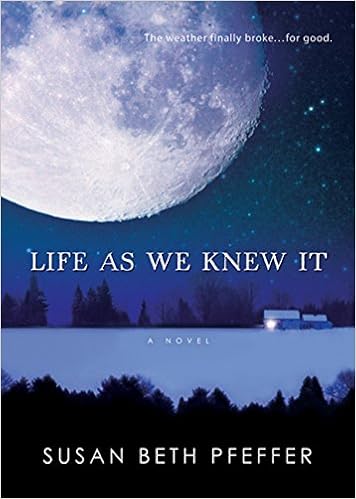 Life As We Knew It
Life As We Knew Itby Susan Beth Pfeffer
reviewed by Emma Willingham
Life As We Knew It, by Susan Beth Pfeffer, is all about a girl named Miranda who leads an ordinary life; has regular problems with friends, with divorced parents, with siblings, with swimming, and with a massive amount of homework. These problems are all deemed trivial when Peter, her mother’s boyfriend, tells her of an asteroid that is meant to hit the moon. Life goes on as usual until the day that the asteroid comes. When the asteroid hits the moon Miranda, her family, and everyone in the world was outside to watch the collision. As soon as it hit everyone gasped in surprise. The moon was unexpectedly hit with more force which made the moon brighter, the moon larger, and the world deadlier. Matt, Miranda’s older brother, soon comes homes from college. Matt simply makes life easier and makes her mother happy to have all of her children home. Matt often acts in a fatherly role to their younger brother, Jonny, and to Miranda. Their family soon realizes that they will need one another to survive.
Miranda learns many values throughout the whole book from learning to survive, to simply being happy because she is alive. Miranda also learns to deal with tragedies. Pfeffer has Miranda take in all the natural disasters the moon causes; volcano eruptions, tsunamis, lack of sunlight, and earthquakes, and learns to handle each with the best of her ability while still valuing what is important to her. Pfeffer demonstrates the lack of appreciation for everyday things by showing how miserable life could be. The author engages the reader by referencing everyday things and places that many would recognize. She gives something to relate to when the rest of the novel seems so impossible. Pfeffer uses common vocabulary to display a complicated plot. Pfeffer also effortlessly depicts a strange world filled with new troubles and situations the world has ever seen.
I would recommend Life As We Knew It, by Susan Beth Pfeffer, to readers who like dystopian novels. Pfeffer often creates thought on how the world could be so I would also recommend this to those who enjoy thinking about the world around them and what it could be. I would also recommend to those who enjoy learning new values such as sacrifice, tolerance, adaptiveness, and joy.
No comments:
Post a Comment